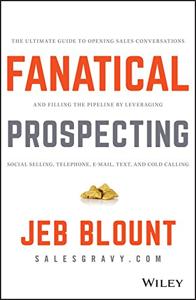
Want to learn the ideas in Fanatical Prospecting better than ever? Read the world’s #1 book summary of Fanatical Prospecting by Jeb Blount here.
Read a brief 1-Page Summary or watch video summaries curated by our expert team. Note: this book guide is not affiliated with or endorsed by the publisher or author, and we always encourage you to purchase and read the full book.
Video Summaries of Fanatical Prospecting
We’ve scoured the Internet for the very best videos on Fanatical Prospecting, from high-quality videos summaries to interviews or commentary by Jeb Blount.
1-Page Summary of Fanatical Prospecting
Overview
If you look at the sales and marketing section of your local bookstore, you will see many books that promise to make your life easy. Follow their pain-free steps and they can make it easier for you to succeed in sales. However, this is not true because selling is difficult. The average salesperson gets rejected more than once before 09:00 a.m., which means that they have to be dedicated and persistent if they want to be successful in their work. If they don’t put in the time, then they won’t last long as a salesman or a marketer.
Jeb Blount, who’s a veteran of the sales field, knows that there are certain things you can do to be successful in sales. He recommends avoiding the “Kool-Aid” and being realistic about what it takes to succeed at selling.
In this article you will learn the following:
Why relying on a single sales methodology is risky.
How to overcome your fear of rejection.
Why putting yourself in your clients’ shoes when making a pitch is important.
Big Idea #1: The secret to sales success is simple: fanatical prospecting.
Sales are essential to a business. Nothing happens until someone, somewhere, sells something. It’s called the Law of Business. But there’s an interesting thing about sales – few people understand how they work and many experts give bad advice on it that doesn’t work. The reason is simple: those experts are only telling you what they want you to hear instead of what actually works because they’re trying to make money off of you by selling some sort of shortcut or magic pill for success which is always false. Joe de Sena states that “Easy is the greatest marketing hook in all time.” People fall for these schemes anyway even though we know that silver-bullet solutions are too good to be true just like with salespeople who often believe them as well because everyone wants immediate success and easier ways to achieve it!
Sales are difficult and time-consuming. Sales superstars, however, understand that it takes a lot of work to be successful in sales. This is because they’ve seen their colleagues who weren’t as dedicated or talented fail at reaching their goals. The real reason why superstars earn more money is because they work harder than others do by pursuing new clients or prospects and not being afraid to ask for the sale when they have an opportunity.
Salespeople who are most successful are the ones that put in the extra time to cultivate new leads and contacts. They don’t waste their time on anything else, including social media. These people know that if they’re constantly feeding new prospects into the pipeline, sales will eventually come out at the other end of it. We’ll take a look at these successful salespeople and how they can teach us about prospecting for business.
Big Idea #2: Fanatical prospectors aren’t scared of rejection, and they go out of their way to interrupt their prospects.
The author doesn’t sugarcoat it. Prospecting isn’t fun because you’re going to have to interrupt people’s day just to sell them something.
When making calls or sending emails, it’s difficult to know how the recipient will respond. A response may be positive and encouraging, but more often than not, you won’t receive a favorable reply. That can be disheartening for people who want approval from others. It’s this fear of rejection that is responsible for some sales teams underperforming. When I’m hired as a consultant by companies with poor sales records, I observe their representatives’ behavior and find them staring at their phones instead of contacting clients in person or on the phone. They’re anxious about what might happen if they make contact with someone who isn’t interested in buying their product or service. In one company that sells insurance policies to existing customers, an agent complained about only being asked to call his existing clients—which he called “cold calling” despite its warmth!





